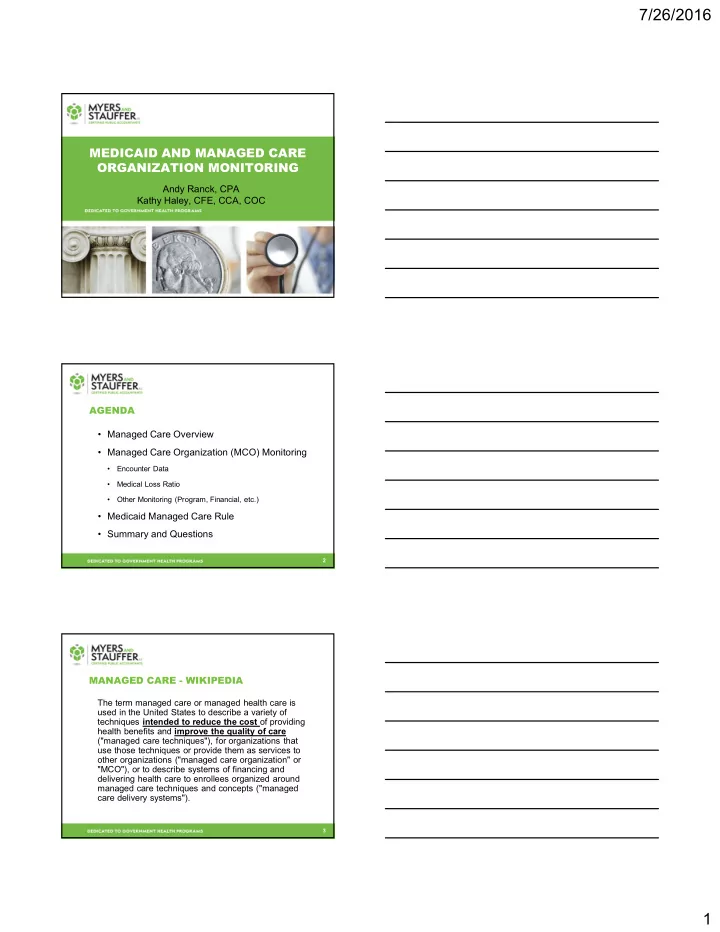

7/26/2016 �������������������������� ����������������������� Andy Ranck, CPA Kathy Haley, CFE, CCA, COC ������ • Managed Care Overview • Managed Care Organization (MCO) Monitoring • Encounter Data • Medical Loss Ratio • Other Monitoring (Program, Financial, etc.) • Medicaid Managed Care Rule • Summary and Questions 2 �������������� ��������� The term managed care or managed health care is used in the United States to describe a variety of techniques intended to reduce the cost of providing health benefits and improve the quality of care ("managed care techniques"), for organizations that use those techniques or provide them as services to other organizations ("managed care organization" or "MCO"), or to describe systems of financing and delivering health care to enrollees organized around managed care techniques and concepts ("managed care delivery systems"). 3 1
7/26/2016 ������������������������������ Managed Care Organizations (MCOs) • Comprehensive benefit package • Payment is risk6based/capitation Primary Care Case Management (PCCM) • Primary care case managers contract with the state to furnish case management (location, coordination, and monitoring) services • Generally, paid fee for service for medical services rendered plus a monthly case management fee 4 ������������������������������� ������� Prepaid Inpatient Health Plan (PIHP) • Limited benefit package that includes inpatient hospital or institutional services (example: mental health) • Payment may be risk or non6risk Prepaid Ambulatory Health Plan (PAHP) • Limited benefit package that does not include inpatient hospital or institutional services (examples: dental and transportation) • Payment may be risk or non6risk 5 ������������������ 6 2
7/26/2016 ��������������� � � 7 ����������� � ����� 8 ����������� � ����� Provider State MCO Provider 9 3
7/26/2016 ���������!������"��#�"�!����! ���������������������������������������������������������������� 10 ���������������������������� 11 ���������������������������� • Runs 5 miles a day • What’s exercise? • No medical issues • Diabetic • Favorite food = broccoli • Congestive Heart Failure • Favorite food = McD’s 12 4
7/26/2016 ���������!��������!$���������! ���������������������������������������������������������������� 13 �����%���!�������������������&&����!�!' 14 ���������������� ��� ������������ 15 5
7/26/2016 �������������� • Encounter Data • What is Encounter Data? • Why is it important? • How is it used to monitor MCOs? • Examples 16 ����������������������� � Encounter data are the records of services delivered to Medicaid beneficiaries enrolled in managed care plans that receive a capitated, per6 member6per6month payment.* � These records allow the Medicaid agency to track the services received by members enrolled in managed care. � The Managed Care Organization (MCO) submits the claims to a data warehouse designated by the state. * http://medicaid.gov/medicaid6chip6program6information/by6topics/data6and6 systems/downloads/medicaid6encounter6data6toolkit.pdf 17 ����������������������� ������� � Claim Form Adjudication*/ information: Payment + = information from (from physician, MCO: facility or ENCOUNTER pharmacy visitE similar to FFS) � Received date � Paid/Denied status � Paid date � Paid amount (incl. any interest paid) � MCO claim number � �other information as requested by the state * adjudication – the process of deciding whether to pay or deny a submitted claim 6
7/26/2016 ������������������� The Managed Care Organization electronically submits the claims data and payment information to the data warehouse. • States are required by CMS to store the encounter data in a data warehouse. A Medicaid Management • Many states outsource this process to a Information System (MMIS) is third6party (typically to their Fiscal the claims processing system Agent Contractor ). used by the Fiscal Agent Contractor (FAC) to adjudicate conventional Medicaid claims. • A contractor selected to design, MCO submitted encounters are develop, and maintain the claims typically loaded into this processing system (Medicaid system and assigned a unique Management Information System) claim identifier. ������������������� • Ideally, the MMIS encounter data should reflect what is in the Managed Care MCO MMIS Organization’s claims data. Claims • Managed Care Organizations are required to submit claims data information based on Per cms.gov, a companion guide is documentation used contract requirements and “to clarify, supplement and companion guides into the further define specific data content requirements to be MMIS or data warehouse. used in conjunction with” standard electronic data submission requirements. ���������������������������������� ������������������������� There are countless potential issues related to encounter submissions 9we can’t cover all of them. We’ll cover three of the most common ones: 1. MISSING ENCOUNTERS 2. DUPLICATED ENCOUNTERS 3. MISSING/ INCOMPLETE/ INCORRECT DATA ELEMENTS 7
7/26/2016 ������������������ ������������������ • Encounter claim is not submitted to MMIS. How it can happen? • Encounter claim is submitted but rejected by MMIS and either is not or cannot be re6worked and re6submitted successfully. • Missing paid encounters Examples: • Missing denied encounters • Missing voids for previously submitted, paid encounters • Inaccurate or incomplete picture of the services members are receiving (or not receiving). Why is this a • Inaccurate or incomplete picture of provider reimbursements (or denials). problem? • Increased difficulty evaluating MCO and vendor compliance. • Potentially inaccurate information used for capitation rate setting, federal reporting, program management, etc. ������������������ ��������������������� • Encounter claim is submitted successfully to MMIS multiple times; MMIS does not identify and reject subsequent How it can encounter(s) as duplicate(s). happen? • An adjustment of a previously submitted encounter claim is not correctly submitted as an adjustment but as a new, original encounter claim. Examples: • See next slide. • Potential over6statement of the services members are receiving. • Potential over6statement of provider reimbursements. Why is this a • Increased difficulty evaluating MCO and vendor compliance. problem? • Potentially over6stated MCO services and expenses used for capitation rate setting, federal reporting, program management, etc. ������������������ ����������������������� ������! Encounter claim is submitted successfully to MMIS multiple times; MMIS does not identify and reject subsequent encounter as duplicate $0 An adjustment of a previously submitted encounter claim is not correctly submitted as an adjustment but as a new, original encounter claim (Ewhich may later be correctly adjusted) 6$15.22 * Confirmed by MCO in the Encounter Reconciliation Reports. Project discussed in later slides. 8
Recommend
More recommend